| Listing 1 - 8 of 8 |
Sort by
|
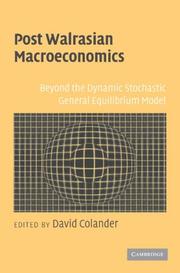
ISBN: 052168420X 0521865484 9780521865487 9780521684200 9786610567669 9780511225925 051122592X 9780511617751 1107169984 128056766X 0511224648 0511226497 051131809X 0511617755 0511225318 9780511226496 0511223307 9780511223303 9781280567667 6610567662 9780511224645 Year: 2006 Publisher: Cambridge Cambridge University Press
Abstract | Keywords | Export | Availability | Bookmark
 Loading...
Loading...Choose an application
- Reference Manager
- EndNote
- RefWorks (Direct export to RefWorks)
Macroeconomics is evolving in an almost dialectic fashion. The latest evolution is the development of a new synthesis that combines insights of new classical, new Keynesian and real business cycle traditions into a dynamic, stochastic general equilibrium (DSGE) model that serves as a foundation for thinking about macro policy. That new synthesis has opened up the door to a new antithesis, which is being driven by advances in computing power and analytic techniques. This new synthesis is coalescing around developments in complexity theory, automated general to specific econometric modeling, agent-based models, and non-linear and statistical dynamical models. This book thus provides the reader with an introduction to what might be called a Post Walrasian research program that is developing as the antithesis of the Walrasian DSGE synthesis.
Macroeconomics --- Equilibrium (Economics) --- Mathematical models. --- -Equilibrium (Economics) --- -339.015195 --- Disequilibrium (Economics) --- Economic equilibrium --- General equilibrium (Economics) --- Partial equilibrium (Economics) --- Economics --- Stagnation (Economics) --- Statics and dynamics (Social sciences) --- Mathematical models --- -Electronic information resources --- Electronic information resources --- E-books --- Equilibrium (Economics). --- DGE (Economics) --- DSGE (Economics) --- Dynamic stochastic general equilibrium (Economics) --- SDGE (Economic theory) --- Business, Economy and Management --- Macroeconomics - Mathematical models.

ISBN: 0691138516 9780691125855 0691125856 9786612158728 1282158724 1400828643 9781400828647 9780691138510 Year: 2008 Publisher: Princeton: Princeton university press,
Abstract | Keywords | Export | Availability | Bookmark
 Loading...
Loading...Choose an application
- Reference Manager
- EndNote
- RefWorks (Direct export to RefWorks)
Economists seem to be everywhere in the media these days. But what exactly do today's economists do? What and how are they taught? Updating David Colander and Arjo Klamer's classic The Making of an Economist, this book shows what is happening in elite U.S. economics Ph.D. programs. By examining these programs, Colander gives a view of cutting-edge economics--and a glimpse at its likely future. And by comparing economics education today to the findings of the original book, the new book shows how much--and in what ways--the field has changed over the past two decades. The original book led to a reexamination of graduate education by the profession, and has been essential reading for prospective graduate students. Like its predecessor, The Making of an Economist, Redux is likely to provoke discussion within economics and beyond. The book includes new interviews with students at Harvard, Princeton, Stanford, MIT, Chicago, and Columbia. In these conversations, the students--the next generation of elite economists--colorfully and frankly describe what they think of their field and what graduate economics education is really like. The book concludes with reflections by Colander, Klamer, and Robert Solow. This inside look at the making of economists will interest anyone who wants to better understand the economics profession. An indispensible tool for anyone thinking about graduate education in economics, this edition is complete with colorful interviews and predictions about the future of cutting-edge economics.
475 --- -Graduate students --- -330.071173 --- Onderwijs van de politieke, economische en sociale wetenschappen. --- Graduate students --- Economists --- Economics --- Economic theory --- Political economy --- Social sciences --- Economic man --- Study and teaching (Graduate) --- United States --- 330.071173 --- 330.08 --- AA / International- internationaal --- US / United States of America - USA - Verenigde Staten - Etats Unis --- Economisten --- Onderwijs van de politieke, economische en sociale wetenschappen --- United States of America
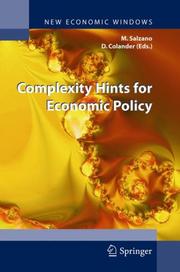
ISBN: 1280864834 9786610864836 8847005345 8847005337 8847056004 Year: 2007 Publisher: Milan ; New York : Springer,
Abstract | Keywords | Export | Availability | Bookmark
 Loading...
Loading...Choose an application
- Reference Manager
- EndNote
- RefWorks (Direct export to RefWorks)
This volume extends the complexity approach to economics. This complexity approach is not a completely new way of doing economics, and that it is a replacement for existing economics, but rather the integration of some new analytic and computational techniques into economists’ bag of tools. It provides some alternative pattern generators, which can supplement existing approaches by providing an alternative way of finding patterns than be obtained by the traditional scientific approach. On this new kind of policy hints can be obtained. The reason why the complexity approach is taking hold now in economics is because the computing technology has advanced. This advance allows consideration of analytical systems that could not previously be considered by economists. Consideration of these systems suggested that the results of the "control-based" models might not extend easily to more complicated systems, and that we now have a method—piggybacking computer assisted analysis onto analytic methods—to start generating patterns that might provide a supplement to the standard approach. It is that approach that we consider the complexity approach. The papers in this volume develop these ideas. In terms of policy the papers suggest that economists should become a bit less certain in their policy conclusions, and that they expand their bag of tools supplementing their standard model with some additional models including (1) agent based models, in which one does not use analytics to develop the pattern, but instead one uses computational power to deal with specification of models that are far beyond analytic solution; and (2) non-linear dynamic stochastic models many of which are beyond analytic solution, but whose nature can be discovered by a combination of analytics and computer simulations. The volume is divided into four sections: general issues, modeling issues, applications, and policy issues. Each struggles with complicated ideas related to our general theme, and a number of them try out new techniques.
Economic policy --- Computational complexity. --- Economics, Mathematical. --- Mathematical models. --- Economics --- Mathematical economics --- Econometrics --- Mathematics --- Complexity, Computational --- Electronic data processing --- Machine theory --- Methodology --- Economic policy. --- Public finance. --- Statistical physics. --- Economic Policy. --- Public Economics. --- Complex Systems. --- Statistical Physics and Dynamical Systems. --- Physics --- Mathematical statistics --- Cameralistics --- Public finance --- Currency question --- Economic nationalism --- Economic planning --- National planning --- State planning --- Planning --- National security --- Social policy --- Statistical methods --- Public finances --- Dynamical systems. --- Dynamical systems --- Kinetics --- Mechanics, Analytic --- Force and energy --- Mechanics --- Statics
Book
ISBN: 9780691152097 0691152098 0691169136 9780691169132 1400850134 9781400850136 9781306711678 1306711673 Year: 2014 Publisher: Princeton (N.Y.): Princeton university press,
Abstract | Keywords | Export | Availability | Bookmark
 Loading...
Loading...Choose an application
- Reference Manager
- EndNote
- RefWorks (Direct export to RefWorks)
Complexity science-made possible by modern analytical and computational advances-is changing the way we think about social systems and social theory. Unfortunately, economists' policy models have not kept up and are stuck in either a market fundamentalist or government control narrative. While these standard narratives are useful in some cases, they are damaging in others, directing thinking away from creative, innovative policy solutions. Complexity and the Art of Public Policy outlines a new, more flexible policy narrative, which envisions society as a complex evolving system that is uncontrollable but can be influenced.David Colander and Roland Kupers describe how economists and society became locked into the current policy framework, and lay out fresh alternatives for framing policy questions. Offering original solutions to stubborn problems, the complexity narrative builds on broader philosophical traditions, such as those in the work of John Stuart Mill, to suggest initiatives that the authors call "activist laissez-faire" policies. Colander and Kupers develop innovative bottom-up solutions that, through new institutional structures such as for-benefit corporations, channel individuals' social instincts into solving societal problems, making profits a tool for change rather than a goal. They argue that a central role for government in this complexity framework is to foster an ecostructure within which diverse forms of social entrepreneurship can emerge and blossom.
Economic policy and planning (general) --- Economic policy --- Complexity (Philosophy) --- Evolutionary economics --- Policy sciences --- Economic policy. --- Evolutionary economics. --- Policy sciences. --- #SBIB:33H000 --- #SBIB:35H006 --- #SBIB:17H25 --- Policy-making --- Policymaking --- Public policy management --- Economics --- Philosophy --- Emergence (Philosophy) --- Economic nationalism --- Economic planning --- National planning --- State planning --- Planning --- National security --- Social policy --- Economie: algemene werken --- Bestuurswetenschappen: theorieën --- Sociale wijsbegeerte: economische orde en arbeid --- Social change --- Political philosophy. Social philosophy --- E-books --- Brian Arthur. --- I Pencil. --- Leonard Reed. --- Santa Fe Institute. --- Stephen Wolfram. --- activist laissez-faire policy. --- bottom-up solutions. --- complexity economics. --- complexity frame. --- complexity models. --- complexity policy. --- complexity science. --- complexity theory. --- complexity. --- computational tools. --- economic models. --- economic policy. --- economics. --- ecostructure. --- education. --- free market. --- game theory. --- government policy. --- government. --- laissez-faire. --- macroeconomics. --- market duality. --- microeconomics. --- neoclassical economics. --- norms policy. --- policy framework. --- policymakers. --- policymaking. --- scientific theory. --- social entrepreneurship. --- social policy. --- social systems. --- social theory. --- society.
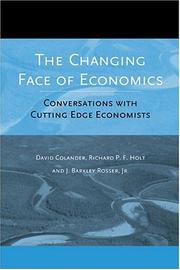
ISBN: 0472098772 0472068776 9786612444692 0472024795 1282444697 9780472024797 9781282444690 661244469X 9780472098774 9780472068777 Year: 2004 Publisher: Ann Arbor : University of Michigan Press,
Abstract | Keywords | Export | Availability | Bookmark
 Loading...
Loading...Choose an application
- Reference Manager
- EndNote
- RefWorks (Direct export to RefWorks)
Economics --- AA / International- internationaal --- 330.2 --- 330.08 --- 8 --- 330.40 --- #SBIB:33H011 --- Geschiedenis van het economisch en sociaal denken --- Evolution historique de la pensée économique et sociale: généralités --- History of the economic and social thinking --- 330.40 Geschiedenis van het economisch en sociaal denken --- 330.40 Evolution historique de la pensée économique et sociale: généralités --- 330.40 History of the economic and social thinking --- Filologie. Letterkunde. --- Philologie. Littérature. --- Philology. Literature. --- 8 Filologie. Letterkunde. --- 8 Philologie. Littérature. --- 8 Philology. Literature. --- Economische analyse en research. Theorie van de informatie. --- Economisten. --- Geschiedenis van het economisch en sociaal denken. --- Economische geschiedenis --- BUSINESS & ECONOMICS --- Economics / General --- Business & Economics --- Economic Theory --- Economists --- Social scientists --- Economic theory --- Political economy --- Social sciences --- Economic man --- Economisten --- Economische analyse en research. Theorie van de informatie --- Filologie. Letterkunde --- Economics.
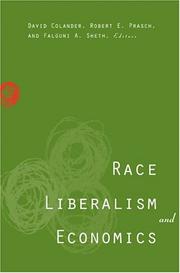
ISBN: 1282445375 9786612445378 0472024841 9780472024841 0472113569 0472032240 9780472113569 9780472032242 Year: 2004 Publisher: Ann Arbor : University of Michigan Press,
Abstract | Keywords | Export | Availability | Bookmark
 Loading...
Loading...Choose an application
- Reference Manager
- EndNote
- RefWorks (Direct export to RefWorks)
Explores how economic reasoning relates to the broader concepts of liberalism and racism.
Electronic books. -- local. --- Liberalism -- United States. --- Race relations -- Economic aspects. --- Racism -- Economic aspects -- United States. --- United States -- Economic policy. --- United States -- Race relations -- Economic aspects. --- Ethnic & Race Studies --- Gender & Ethnic Studies --- Social Sciences --- Economic order --- United States --- Race relations --- Racism --- Liberalism --- Liberal egalitarianism --- Liberty --- Political science --- Social sciences --- Bias, Racial --- Race bias --- Race prejudice --- Racial bias --- Prejudices --- Anti-racism --- Critical race theory --- Economic aspects. --- Economic aspects --- ABŞ --- ABSh --- Ameerika Ühendriigid --- America (Republic) --- Amerika Birlăshmish Shtatlary --- Amerika Birlăşmi Ştatları --- Amerika Birlăşmiş Ştatları --- Amerika ka Kelenyalen Jamanaw --- Amerika Qūrama Shtattary --- Amerika Qŭshma Shtatlari --- Amerika Qushma Shtattary --- Amerika (Republic) --- Amerikai Egyesült Államok --- Amerikanʹ Veĭtʹsėndi︠a︡vks Shtattnė --- Amerikări Pĕrleshu̇llĕ Shtatsem --- Amerikas Forenede Stater --- Amerikayi Miatsʻyal Nahangner --- Ameriketako Estatu Batuak --- Amirika Carékat --- AQSh --- Ar. ha-B. --- Arhab --- Artsot ha-Berit --- Artzois Ha'bris --- Bí-kok --- Ē.P.A. --- EE.UU. --- Egyesült Államok --- ĒPA --- Estados Unidos --- Estados Unidos da América do Norte --- Estados Unidos de América --- Estaos Xuníos --- Estaos Xuníos d'América --- Estatos Unitos --- Estatos Unitos d'America --- Estats Units d'Amèrica --- Ètats-Unis d'Amèrica --- États-Unis d'Amérique --- Fareyniḳṭe Shṭaṭn --- Feriene Steaten --- Feriene Steaten fan Amearika --- Forente stater --- FS --- Hēnomenai Politeiai Amerikēs --- Hēnōmenes Politeies tēs Amerikēs --- Hiwsisayin Amerikayi Miatsʻeal Tērutʻiwnkʻ --- Istadus Unidus --- Jungtinės Amerikos valstybės --- Mei guo --- Mei-kuo --- Meiguo --- Mî-koet --- Miatsʻyal Nahangner --- Miguk --- Na Stàitean Aonaichte --- NSA --- S.U.A. --- SAD --- Saharat ʻAmērikā --- SASht --- Severo-Amerikanskie Shtaty --- Severo-Amerikanskie Soedinennye Shtaty --- Si︠e︡vero-Amerikanskīe Soedinennye Shtaty --- Sjedinjene Američke Države --- Soedinennye Shtaty Ameriki --- Soedinennye Shtaty Severnoĭ Ameriki --- Soedinennye Shtaty Si︠e︡vernoĭ Ameriki --- Spojené obce severoamerické --- Spojené staty americké --- SShA --- Stadoù-Unanet Amerika --- Stáit Aontaithe Mheiriceá --- Stany Zjednoczone --- Stati Uniti --- Stati Uniti d'America --- Stâts Unîts --- Stâts Unîts di Americhe --- Steatyn Unnaneysit --- Steatyn Unnaneysit America --- SUA (Stati Uniti d'America) --- Sŭedineni amerikanski shtati --- Sŭedinenite shtati --- Tetã peteĩ reko Amérikagua --- U.S. --- U.S.A. --- United States of America --- Unol Daleithiau --- Unol Daleithiau America --- Unuiĝintaj Ŝtatoj de Ameriko --- US --- USA --- Usono --- Vaeinigte Staatn --- Vaeinigte Staatn vo Amerika --- Vereinigte Staaten --- Vereinigte Staaten von Amerika --- Verenigde State van Amerika --- Verenigde Staten --- VS --- VSA --- Wááshindoon Bikéyah Ałhidadiidzooígíí --- Wilāyāt al-Muttaḥidah --- Wilāyāt al-Muttaḥidah al-Amirīkīyah --- Wilāyāt al-Muttaḥidah al-Amrīkīyah --- Yhdysvallat --- Yunaeted Stet --- Yunaeted Stet blong Amerika --- ZDA --- Združene države Amerike --- Zʹi︠e︡dnani Derz︠h︡avy Ameryky --- Zjadnośone staty Ameriki --- Zluchanyi︠a︡ Shtaty Ameryki --- Zlucheni Derz︠h︡avy --- ZSA --- Η.Π.Α. --- Ηνωμένες Πολιτείες της Αμερικής --- Америка (Republic) --- Американь Вейтьсэндявкс Штаттнэ --- Америкӑри Пӗрлешӳллӗ Штатсем --- САЩ --- Съединените щати --- Злучаныя Штаты Амерыкі --- ولايات المتحدة --- ولايات المتّحدة الأمريكيّة --- ولايات المتحدة الامريكية --- 미국 --- Economic policy. --- États-Unis --- É.-U. --- ÉU
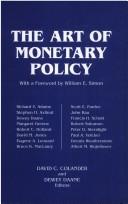
ISBN: 131745829X 1563243474 1317458303 1315700255 9781317458302 9781563243462 1563243466 9781563243479 Year: 2015 Publisher: London ; New York : Routledge,
Abstract | Keywords | Export | Availability | Bookmark
 Loading...
Loading...Choose an application
- Reference Manager
- EndNote
- RefWorks (Direct export to RefWorks)
Offering an introduction to the Japanese political system, this book covers the end of the Koizumi era, the brief and troubled premiership of Abe, and the selection of Fukuda as prime minister. It includes material on ""bubble"" and ""post-bubble"" economic developments, as well as coverage of health care policy.
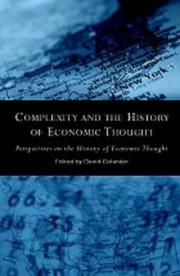
ISBN: 0415133564 0415756626 0203436008 1280137878 0203286812 042923175X 9780203286814 9780203436004 0203744241 9780203744246 9780415756624 9786610137879 6610137870 9780415133562 9781134785049 9781134785087 1134785089 Year: 2000 Publisher: London: Routledge,
Abstract | Keywords | Export | Availability | Bookmark
 Loading...
Loading...Choose an application
- Reference Manager
- EndNote
- RefWorks (Direct export to RefWorks)
This book consists of twelve studies on the issues of complexity and the history of economic thought. The studies relate complexity to the ideas of specific economists such as Adam Smith, Karl Marx, Alfred Marshall and Ragnar Frisch.
Economic schools --- Economics --- Complexity (Philosophy) --- History --- Congresses --- Economics - History - Congresses. --- Business. --- Business & Economics --- Economic Theory --- Economics - History - Congresses --- Complexity (Philosophy) - Congresses
| Listing 1 - 8 of 8 |
Sort by
|

 Search
Search Feedback
Feedback About UniCat
About UniCat  Help
Help News
News